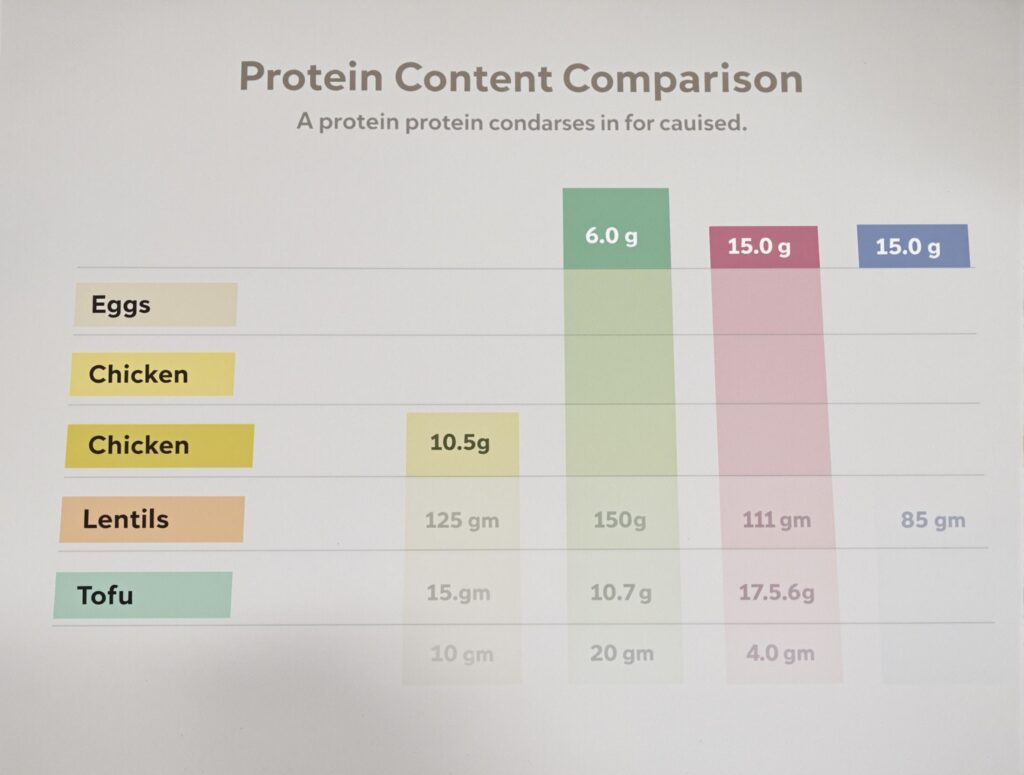Eggs are one of the most common and versatile foods in the world. Whether you’re a fitness enthusiast or just curious about your diet, understanding the protein content in an egg is important. Protein plays a key role in building and repairing tissues, and eggs are often celebrated as a rich and affordable source of this nutrient.
In this article, we’ll explore how much protein is in one egg, the nutritional value of eggs, and how they compare to other protein sources. We’ll also discuss the health benefits of egg protein and answer some frequently asked questions. Let’s dive in!
Nutritional Value of an Egg
Eggs are often called “nature’s multivitamin,” thanks to their impressive nutrient profile. They contain a wide range of essential vitamins and minerals, along with healthy fats and, of course, protein.
Protein Content in an Egg: White vs Yolk
The protein content in an egg depends on its size, but a medium-sized egg typically contains about 6-7 grams of protein. Interestingly, the protein isn’t evenly distributed between the egg white and yolk:
- Egg White: About 3.6 grams of protein. This is the part of the egg most people associate with high protein and low calories.
- Egg Yolk: Contains about 2.7 grams of protein, along with fats, vitamins, and essential nutrients like choline.
If you eat both the yolk and the white, you get the full 6-7 grams of protein in one egg, making it a complete and well-rounded source of nutrition.
Other Nutrients Found in Eggs
Beyond protein, eggs are packed with essential nutrients, such as:
- Vitamin B12: Helps maintain healthy nerve and blood cells.
- Vitamin D: Supports bone health.
- Iron: Important for oxygen transport in the body.
- Choline: Crucial for brain function and liver health.
Eggs are low in calories, with one medium egg containing just 70 calories, making them a nutrient-dense food option.
Protein Benefits for the Body
Protein is a vital nutrient that supports many functions in the body, and the protein found in eggs is especially beneficial. It is considered a complete protein, meaning it contains all nine essential amino acids that your body cannot produce on its own. Here are some of the key benefits of egg protein.
Muscle Building and Repair
Protein is crucial for building and maintaining muscle mass. This is especially important for athletes, bodybuilders, or anyone recovering from an injury. The high-quality protein in eggs helps repair muscle tissue after exercise, making eggs a popular choice for post-workout meals or snacks.
Support for Weight Management
Eggs can help you feel full and satisfied for longer periods, thanks to their combination of protein and healthy fats. This feeling of fullness, or satiety, can reduce overall calorie intake throughout the day. Studies have shown that starting your day with eggs instead of a high-carb breakfast can aid in weight management by curbing hunger.
Energy and Metabolism
The amino acids in egg protein are essential for energy production and metabolism. These amino acids help create enzymes and hormones that regulate energy levels, ensuring your body functions efficiently throughout the day.
Support for Immune Function
Protein is also vital for a healthy immune system. The amino acids in egg protein contribute to the production of antibodies, which help protect your body against infections and illnesses. Including eggs in your diet can provide an easy and affordable way to meet your protein needs and support your overall health.

Different Ways to Cook Eggs and Their Protein Impact
Eggs are incredibly versatile and can be cooked in many different ways. However, you might wonder if cooking methods affect their protein content. Here’s how different preparations impact the protein and other nutrients in eggs.
Boiled Eggs
Hard-boiled and soft-boiled eggs are some of the healthiest ways to cook eggs. They retain nearly all their protein content because they are cooked without additional fats or oils. A medium-sized boiled egg contains approximately 6 grams of protein, making it an excellent choice for a quick and healthy snack.
Scrambled Eggs
Scrambled eggs are a popular breakfast option, but the protein content can vary depending on how they are prepared. Adding milk, cheese, or butter to scrambled eggs will increase the calorie count but not significantly affect the protein. The base protein content remains around 6-7 grams per egg.
Poached Eggs
Poached eggs are another healthy option because they are cooked in water without added fats. Like boiled eggs, the protein content remains intact, and the texture makes them a favorite topping for dishes like avocado toast.
Does Cooking Affect Protein?
Cooking eggs does not significantly reduce their protein content. However, it can affect the availability of certain other nutrients. For example, some heat-sensitive vitamins, like vitamin B2, may decrease slightly during cooking. On the other hand, cooking eggs makes their protein more digestible and easier for the body to absorb.
How Eggs Compare to Other Protein Sources
Eggs are considered one of the best sources of high-quality protein, but how do they stack up against other popular protein options? Let’s take a closer look at how eggs compare to meat, dairy, and plant-based proteins.
Eggs vs Meat
Meat, such as chicken, beef, or fish, generally contains more protein per serving than eggs. For example, 100 grams of cooked chicken breast provides about 31 grams of protein, while one medium-sized egg offers 6-7 grams. However, eggs are much lower in calories and fat than many cuts of meat, making them an excellent choice for those seeking a lean protein source. Eggs are also quicker to prepare, making them a convenient option for busy mornings or snacks.
Eggs vs Dairy
Dairy products like milk, cheese, and yogurt are also great sources of protein. A cup of milk provides about 8 grams of protein, which is comparable to an egg. However, eggs have the advantage of being a complete protein source, containing all essential amino acids in a highly digestible form. While dairy is also complete, it may not be suitable for those who are lactose intolerant or allergic, making eggs a versatile alternative.
Eggs vs Plant-Based Proteins
Plant-based proteins like lentils, chickpeas, and tofu are increasingly popular among vegetarians and vegans. While these foods are rich in protein, they often require combination with other plant foods to provide all nine essential amino acids. Eggs, on the other hand, naturally contain these amino acids, making them a superior choice for those looking for a complete and easy-to-digest protein source.
How Many Eggs Should You Eat in a Day?
Eggs are nutritious, but the right amount to eat daily depends on your health goals, lifestyle, and dietary needs.

Balancing Protein Needs
Most adults need about 50-60 grams of protein per day, depending on their weight, activity level, and age. With one egg providing around 6-7 grams of protein, eating two to three eggs a day can contribute significantly to your daily protein intake. For those with higher protein requirements, such as athletes or people aiming to build muscle, eggs can be a convenient addition to meals or snacks.
Considering Cholesterol
For years, there was concern about the cholesterol content in eggs, as one large egg contains about 186 milligrams of cholesterol, mostly in the yolk. However, recent studies show that dietary cholesterol has little impact on blood cholesterol levels for most people. Experts now agree that eating up to three eggs per day is safe for most healthy individuals.
Variety in Your Diet
While eggs are a great source of protein, it’s important to include other protein-rich foods in your diet, such as lean meats, fish, legumes, and dairy. This ensures you get a diverse range of nutrients and avoid over-reliance on any single food source.
If you love experimenting with unique flavor profiles, take a look at our guide to:
- Protein Bread – Packed with nutrients, perfect for a healthy snack or post-workout meal.
- Cinnamon Rolls – A sweet, comforting treat with a warm spice flavor.
- Banana Bread Cookies – Soft, chewy cookies with the classic taste of banana bread.
- French Vanilla Creamer – Add rich, creamy vanilla goodness to your morning coffee.
Click the links to explore these mouthwatering recipes!
FAQs with People Also Ask
Is 2 eggs a day enough protein?
Two eggs provide about 12-14 grams of protein, which is a good amount but not enough for most adults. You may need other protein-rich foods to meet your daily goal of 50-60 grams.
What food is the highest in protein?
Foods like chicken breast, fish, and beef are the highest in protein. For example, chicken breast has 31 grams of protein per 100 grams. Eggs and plant-based options like lentils are also great sources.
How many eggs make 50g of protein?
You’d need about 7-8 eggs to get 50 grams of protein. Eating a mix of eggs and other protein sources is a better way to meet your needs.
How much protein do you need a day?
Most adults need 50-60 grams of protein a day. Athletes or active people may need more, depending on their weight and activity level.
Conclusion
Eggs are an incredibly nutritious and affordable food, offering a rich source of high-quality protein along with essential vitamins and minerals. With about 6-7 grams of protein per medium-sized egg, they are a convenient way to help meet your daily protein requirements. Whether you eat them boiled, scrambled, poached, or fried, eggs can fit into a variety of meals and diets.
They’re also a complete protein, containing all nine essential amino acids your body needs, which makes them especially valuable compared to many plant-based protein sources. While two eggs a day may be enough for some, others with higher protein needs may benefit from incorporating more eggs or other protein-rich foods into their diet.
As long as you balance your intake and include other nutrient-dense foods, eggs can play an important role in supporting muscle health, weight management, and overall wellness. So, whether you’re starting your day with an omelet or adding a hard-boiled egg to your salad, you’re making a healthy, protein-packed choice!

